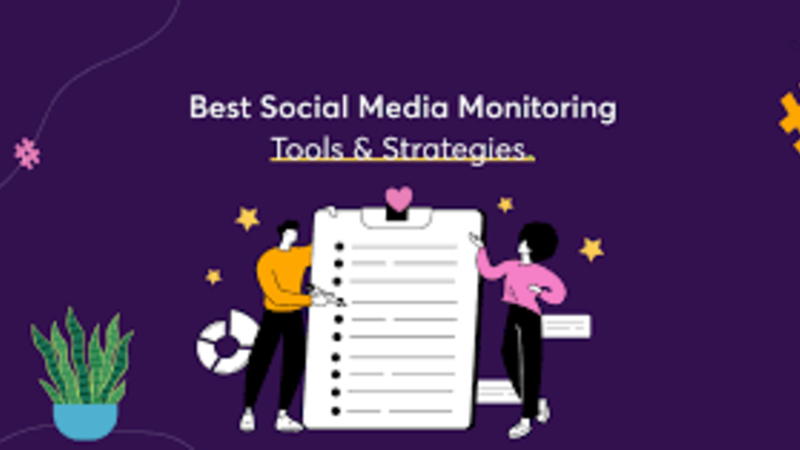What is social media monitoring?
Social media monitoring entails the identification and analysis of the conversations that are done on social platforms regarding the brand, products, competitors, and the industry. Its practical application for analyzing body language in marketing and other contexts makes it possible for business establishments to obtain real-time data concerning the public impression and the success of marketing campaigns. It is a means of monitoring the perception made towards the brand and also a means of programming the strategies made according to the perception made towards the brand.
Although you probably use social media daily for posting updates, responding to followers, and managing campaigns social media monitoring goes a step further. It refers to the process of paying attention carefully and in a probing manner to other people’s discourse apart from everyday communication to identify trends and moods.
Differentiating key terms in social media monitoring
To navigate social media effectively, it’s crucial to understand these related terms:
- Social media monitoring: Following any post, message, or topic that contains the keywords relevant to your brand or particular industry.
- Social media listening: Gaining a better understanding of the discussions happening on social media by breaking down the tone, and the emotions behind the posts as well as a wider context.
- Social media analytics: Collecting the quantitative data in terms of mentions, retweets, and overall impressions.
- Social media intelligence: Translating the information collected from monitoring and analytics for decision-making.
- Social media management: Maintaining and managing operations such as sharing content on a daily basis or interacting with the audience.
Implementing social media monitoring
To enhance your social media strategy, begin by setting clear priorities and identifying key terms to track:
- Brand and product keywords: Monitor mentions of your brand name, products, and associated taglines or phrases.
- Industry terms: Keep an eye on discussions about industry topics and emerging trends.
- Competitor keywords: Observe your competitors’ mentions to assess their performance and understand their audience.
Utilize a combination of social media and SEO search features like hashtags and @tags to follow relevant conversations. However, manual searches alone can be inefficient and time-consuming.
Best practices for social media monitoring
- Know your audience: Understand who your audience is and tailor your monitoring to their demographics and interests.
- Track brand mentions: Monitor both tagged and untagged mentions of your brand. Be aware of misspellings and foreign language mentions.
- Monitor brand-adjacent terms: Track conversations about product categories and related terms to capture potential customer interest.
- Check branded hashtags: Analyze the performance of campaign hashtags and monitor their usage to gauge campaign success.
- Avoid overemphasis on longtail keywords: While specific phrases can be valuable, they should complement broader keyword tracking to avoid missing relevant mentions.
- Use comprehensive software: Opt for tools with strong monitoring features that integrate seamlessly with your current marketing systems.
- Study competitors: Track your competitors’ brand mentions and campaigns to discover opportunities and enhance your strategies.
- Find influencers: Utilize monitoring tools to identify and connect with influencers who can boost your brand’s message.
- Set up a unified inbox: Consolidate your social media interactions to handle and respond to customer queries more efficiently.
- Engage directly with customers: Use insights from monitoring to craft personalized responses and foster stronger relationships.
- Address negative feedback: Quickly address and resolve issues that could harm your brand’s reputation.
- Monitor market interests: Stay updated on trending topics and consumer interests to capitalize on emerging opportunities.
- Stick to your goals: Focus on relevant data to avoid being overwhelmed and ensure your monitoring efforts align with your brand’s objectives.
Tools and techniques for effective monitoring
Given the vast amount of data and the need for timely responses, manual monitoring is often impractical. Social media monitoring tools can streamline the process:
- Track keywords across platforms: Social media monitoring tools enable keyword tracking across multiple social networks from a single interface.
- Analyze sentiments: Assess public sentiment by examining the tone and context of conversations.
- Respond quickly: Set up alerts and automate responses to handle customer inquiries and manage crises efficiently.
These tools also help gather insights from a range of sources, including major social networks and niche platforms, ensuring thorough coverage.
Final Thoughts
Social media platforms have transformed marketing, offering vast opportunities for brand visibility and engagement but also posing risks like reputation damage. Effective monitoring is essential to manage these risks and maximize the benefits.
By tracking conversations about your brand and industry, businesses can gain insights, manage their online presence, and make informed decisions. Using advanced tools and best practices in social media monitoring can help brands navigate the digital landscape, ensuring growth and a positive reputation.
Author Bio:
A self-made specialist in digital marketing, I am Suyash Sidharth passionate about boosting online success with unmatched digital marketing strategies backed by data. I have a broad history in the dynamic field of digital marketing and combine technical knowledge with strategic thinking to skyrocket brands to new extremes. Being a dynamic expert, I use several techniques based on my experience to improve online exposure and engagement. I have a thorough understanding of SEO, PPC, WordPress, social media, and content marketing. My creative thinking and sharp analytical command have assisted in the growth of multiple companies, revealing my ability to adjust to the quickly evolving digital environment. I am experienced with hands-on experience in the field of digital marketing, helping companies to prosper in the digital age; my curiosity about digital marketing helps me stay ahead of industry trends. If anyone wants any advice, you will be the best option to consult.
